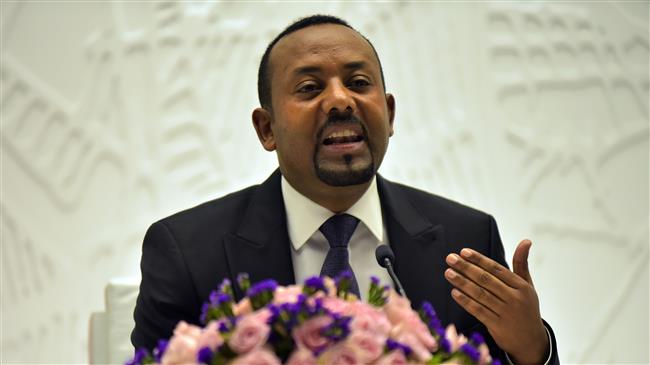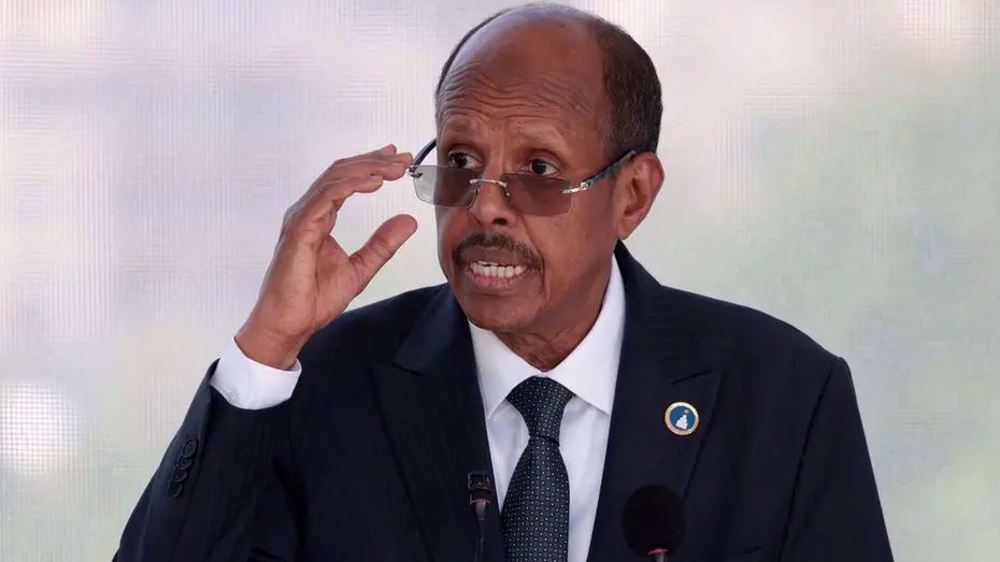Ethiopian PM wins Nobel Peace Prize for mending ties with Eritrea
Hailed as a visionary and reformer, Ethiopian Prime Minister Abiy Ahmed won the Nobel Peace Prize on Friday for his efforts to resolve the long-running conflict with neighboring foe Eritrea.
Prime Minister Abiy was honored "for his efforts to achieve peace and international cooperation, and in particular for his decisive initiative to resolve the border conflict with neighboring Eritrea," the Nobel Committee said.
Since coming to power in April 2018, after years of civil unrest in the nation, 43-year-old Abiy Ahmed has started mending relations with Eritrea following decades of conflict between the countries.
On July 9, 2018, following a historic meeting in Eritrea's capital Asmara, Abiy and Eritrean President, Isaias Afwerki, formally ended a 20-year-old stalemate between the countries in the wake of the 1998-2000 border conflict.
A peace deal was signed later that year, and embassies have been reopened and flight routes between the countries resumed.
The continent's youngest leader has instilled certain optimism in a region of Africa marred by violence.
"There is a wind of hope blowing in the Horn of Africa," UN Secretary-General Antonio Guterres said in September 2018.
The Nobel jury stressed that the Peace Prize was "also meant to recognize all the stakeholders working for peace and reconciliation in Ethiopia and in the East and Northeast African regions."
The Committee singled out Eritrean President, Isaias Afwerki, for praise, noting that "peace does not arise from the actions of one party alone."
"When Prime Minister Abiy Ahmed reached out his hand, President Afwerki grabbed it, and helped to formalize the peace process between the two countries."
The committee had to choose from more than 300 nominations this year.
Online betting sites had put Swedish climate activist Greta Thunberg -- who has already received Amnesty International's top honor and the Right Livelihood Award, sometimes dubbed the "alternative Nobel" -- as the name to beat.
Last year, the honor went to Congolese doctor, Denis Mukwege, and Yazidi campaigner, Nadia Murad, for their work in fighting sexual violence in conflicts around the world.
This year's prize will be presented at a ceremony in Oslo on December 10, the anniversary of the 1896 death of prize creator Alfred Nobel, a Swedish philanthropist and scientist.
The award consists of a gold medal, a diploma, and nine million Swedish kronor (around $912,000 or 828,000 euro).
On Thursday, the Swedish Academy in Stockholm awarded the 2018 Nobel Literature Prize, which it had postponed in the wake of a sexual harassment scandal, to Polish writer Olga Tokarczuk.
The 2019 prize was awarded to Austrian novelist, Peter Handke, a choice that has sparked outrage because of his vocal support of Serbs during the bloody collapse of the former Yugoslavia.
Achievements in Medicine, Physics and Chemistry have already been honored and the Economics Prize will wrap up the 2019 Nobel Prize season on October 14.
Ethiopia 'proud as a nation'
Prime Minister Abiy Ahmed's office said Friday that Ethiopia was proud of his Nobel Peace Prize win, hailing it as testimony to his efforts to reform the nation and seek peace with Eritrea.
"We are proud as a nation," his office wrote on Twitter after the announcement of Abiy's win.
In a statement, his office further praised the decision as "timeless testimony to the... ideals of unity, cooperation and mutual co-existence that the Prime Minister has been consistently championing.”
"Since Prime Minister Abiy Ahmed assumed political leadership in April 2018 he has made peace, forgiveness and reconciliation key policy components of his administration," the statement said.
"At a national level, the release of tens of thousands of political prisoners, granting of amnesty for media entities and political parties charged under the anti-terrorism law to return from exile and engage peacefully, widening the space for political parties... are some notable milestones."
"At the regional level, ending the two-decade stalemate between Ethiopia and Eritrea has opened up a new dimension of possibilities for co-operation between the two countries. Furthermore the prime minister has also been making efforts to reconcile differences among Horn region countries with a commitment to a shared future."
However, despite Abiy's moves for peace, the Eritrea deal has been undermined by a lack of tangible progress on critical issues like border demarcation.
Hopes that it may lead to an opening up of one of the world's most isolated countries, and the ending of forced military conscription have also yet to bear fruit.
(Source: AFP)
‘Textbook definition of terrorism’: Tehran denounces Pelosi’s call on US to exact ‘pain’ on Iranians
VIDEO | 39th AU summit opens in Addis Ababa with focus on water security, peace, and development
VIDEO | Iran: The stronghold Washington lost
Anti-Iran ‘Munich circus’ shows Europe has lost geopolitical weight: Araghchi
Swiss to act as venue of next round of Iran-US talks: Report
Report: Over 50,000 soldiers fighting in Israeli military hold foreign citizenship
Danish PM warns US attack on Greenland would spell end of NATO
Power running out at key Gaza hospital, ICU patients at risk: Report











 This makes it easy to access the Press TV website
This makes it easy to access the Press TV website